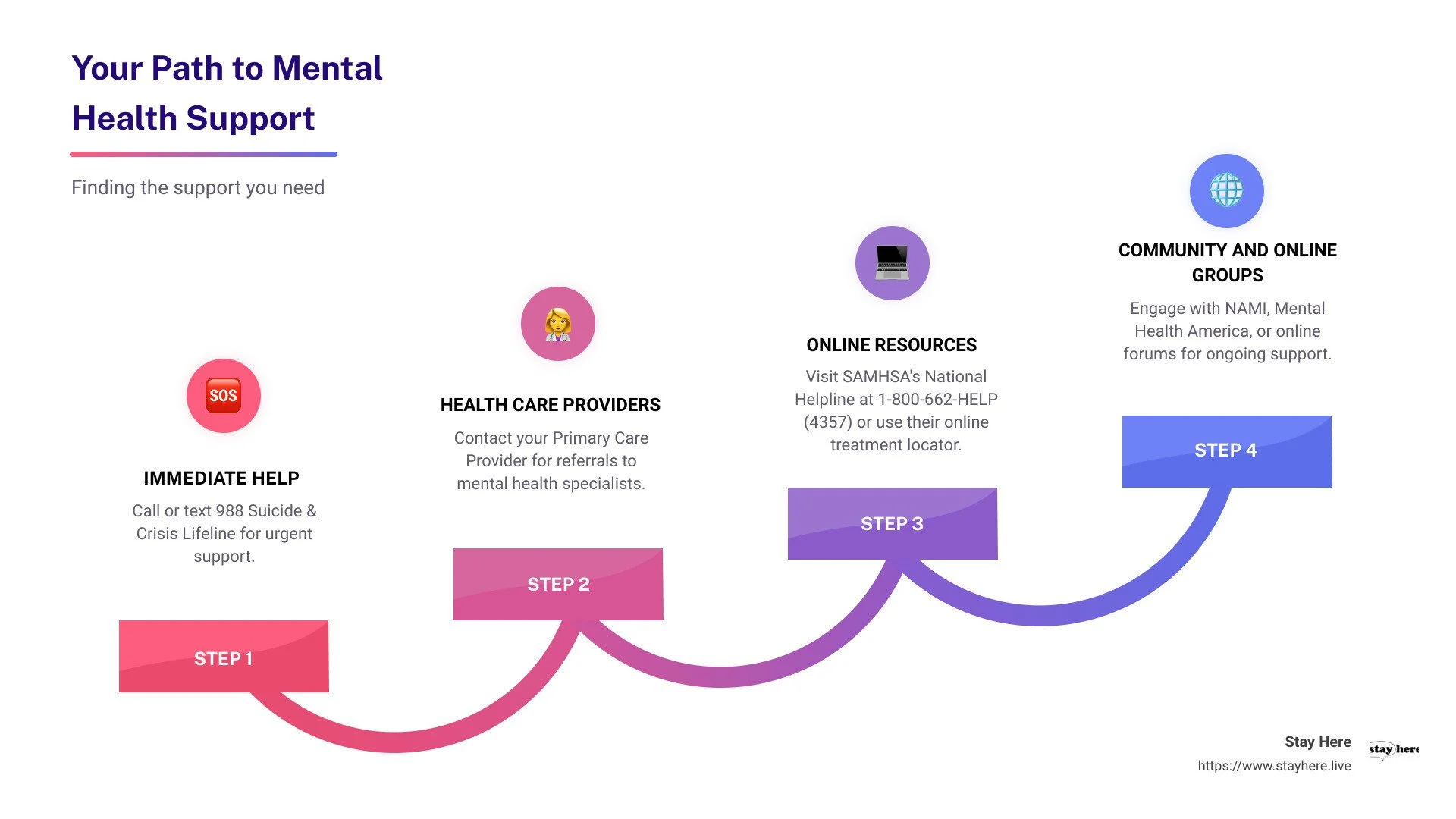An Essential Guide to Finding Mental Health Support Options
If you're looking for mental health support, here’s a quick guide:
Immediate Help: Call or text 988 Suicide & Crisis Lifeline for urgent support.
Health Care Providers: Contact your Primary Care Provider for referrals to mental health specialists.
Online Resources: Visit SAMHSA's National Helpline at 1-800-662-HELP (4357) or use their online treatment locator.
Community and Online Groups: Engage with NAMI, Mental Health America, or online forums for ongoing support.
Mental health is a crucial part of our overall wellbeing. It impacts how we think, feel, act, make choices, and relate to others. Finding the right support can be a game-changer, offering new ways to handle challenges, big and small. It’s okay to seek help. You’re not alone, and there are many out there ready to offer the support you need.
Finding the right kind of help is essential. Whether it's a crisis hotline, a healthcare provider, or an online resource, the right support can empower you to overcome obstacles and improve your mental health. The journey starts with understanding your needs and seeking appropriate support. Together, we can build a stronger, healthier, supportive community where no one feels they have to struggle in silence.
Types of Mental Health Support
When it comes to finding help for mental health issues, knowing what types of support are available can make all the difference. Whether you're dealing with a crisis or looking for long-term support, there are resources ready to assist. Let's dive into some of the key types of mental health support available.
Community Mental Health Teams (CMHTs): These teams are made up of professionals like psychiatrists, social workers, and nurses who work together to provide specialized care. They support people with more complex or severe mental health needs.
Substance Abuse and Mental Health Services Administration (SAMHSA): SAMHSA offers a wealth of resources, including a National Helpline (1-800-662-HELP (4357)) that provides treatment referral and information services for individuals and families facing mental and/or substance use disorders.
Crisis Text Line: By texting "HELLO" to 741741, anyone in crisis can connect with a trained crisis counselor, 24/7. This service is particularly appealing for those who prefer texting over talking on the phone.
988 Suicide & Crisis Lifeline: Dialing 988 connects individuals to a network of local crisis centers, providing emotional support and crisis intervention to anyone in need. This service is confidential and available 24/7.
Veterans Crisis Line: Veterans or their loved ones can call 1-800-273-TALK (8255) and press 1, text 838255, or use the online chat to connect with a trained responder. This line is dedicated to helping veterans in crisis.
National Disaster Distress Helpline: By calling or texting 1-800-985-5990, individuals affected by natural or human-caused disasters can receive immediate crisis counseling.
National Domestic Violence Hotline: Those facing domestic violence can call 1-800-799-7233, text "LOVEIS" to 22522, or use the online chat for support. This hotline provides confidential assistance and connects individuals to resources in their area.
National Sexual Assault Hotline: By calling 1-800-656-HOPE (4673) or using the online chat, survivors of sexual assault can find support and resources. This hotline ensures confidentiality and offers help 24/7.
Each of these resources provides a unique type of support, catering to different needs and preferences. Whether you're in immediate crisis or seeking long-term help, reaching out is the first step towards recovery. You're not alone, and help is available.
For more detailed information about the types of mental health support and how to access them, visiting the Substance Abuse and Mental Health Services Administration (SAMHSA) website can be a great starting point.
As we transition into understanding how to identify your own mental health needs, keep in mind that the right support can make a significant difference in your journey towards wellness.
Identifying Your Needs
When it comes to mental health, knowing what you need is half the battle. Whether you're feeling blue, anxious, or just not yourself, understanding the type of disorder you might be experiencing can guide you to the right help. Let's dive into the basics of mood disorders, anxiety disorders, personality disorders, and psychotic disorders.
Mood Disorders
Mood disorders affect how you feel, which can ripple out to how you think and handle daily activities. Depression and bipolar disorder are the headliners here. If you're feeling persistently sad, hopeless, or have swings between high (mania) and low (depression) moods, you might be dealing with a mood disorder.
Anxiety Disorders
If worry and fear are your constant companions, you might be looking at an anxiety disorder. This category includes generalized anxiety disorder (GAD), panic disorder, and phobias. Symptoms can range from the occasional anxiety attack to an almost constant state of worry.
Personality Disorders
Personality disorders are patterns of thinking, feeling, and behaving that deviate from cultural expectations and cause distress or problems functioning. Examples include borderline personality disorder (BPD), narcissistic personality disorder (NPD), and antisocial personality disorder (ASPD). These disorders can make it tough to relate to others and handle everyday stress.
Psychotic Disorders
Psychotic disorders involve distorted thinking and awareness. The most common one is schizophrenia, which may include hallucinations (seeing or hearing things that aren't there) or delusions (believing things that aren't true). These symptoms can be very disorienting and scary.
Identifying your need is about recognizing these signs and symptoms in yourself or someone you care about. It's okay if you can't put a label on what you're feeling right now. The important thing is to acknowledge that you're struggling and to reach out for help.
Each of these disorders can only be diagnosed by a professional. If you think you or a loved one might be dealing with any of these issues, seeking help from a mental health professional is a crucial next step. They can offer a detailed assessment and guide you towards the appropriate support and treatment.
As we move forward in our guide, identifying your needs is an important step in finding the right mental health support. Whether it's reaching out to a crisis line in a moment of need or looking for long-term therapy options, starting with a basic understanding of what you're experiencing is key.
Next, we'll explore how to handle Immediate Help for Mental Health Crises, including vital resources like the 988 Lifeline and the Crisis Text Line.
Immediate Help for Mental Health Crises
When you or someone you know is facing a mental health crisis, knowing where to turn can make all the difference. Here are some lifesaving resources:
988 Suicide & Crisis Lifeline
What It Is: A 24/7 service that offers confidential support to people in suicidal crisis or emotional distress.
How to Use: Call or text 988. You can also chat online. It's available to everyone in the U.S.
Why It's Important: Immediate access to trained crisis counselors can provide the support and intervention needed during critical moments.
Crisis Text Line
What It Is: A free, 24/7 text-based support service for those in crisis.
How to Use: Text "HELLO" to 741741. A real person will text you back, ready to help.
Why It's Important: Sometimes, texting feels more comfortable than talking. This service ensures you're not alone, offering a discreet way to seek help.
Emergency Services
What It Is: Quick access to emergency responders who can assist in life-threatening situations.
How to Use: Call 911 if you or someone you know is in immediate danger.
Why It's Important: In situations where there's a risk to life, these services can provide urgent medical attention and ensure safety.
Veterans Crisis Line
What It Is: A dedicated service for veterans experiencing a mental health crisis.
How to Use: Call 1-800-273-TALK (8255) and press 1 or text to 838255. Online chat is also available.
Why It's Important: Veterans may face unique challenges. This line connects them with responders who understand these issues, providing tailored support.
In moments of crisis, reaching out for help is a brave and necessary step towards safety and recovery. These resources are here for you, equipped to provide the immediate support you need. Whether it's a conversation to calm your nerves or intervention in a life-threatening situation, you're not alone.
Finding long-term support will be our next focus, ensuring you have the resources for ongoing care and management of mental health concerns.
For more details on these services, visit SAMHSA's National Helpline.
Finding Long-Term Support
Finding sustainable, long-term mental health support is crucial for anyone dealing with mental health issues. It's about building a support system that will be there for you through thick and thin. Here's how to connect with long-term mental health resources:
SAMHSA Treatment Locator
The Substance Abuse and Mental Health Services Administration (SAMHSA) provides a comprehensive online tool that helps you find treatment facilities in the United States for addiction and mental health problems. Just enter your location to get a list of facilities, including details on the types of care provided.
Local Community Resources
Your local community might surprise you with the breadth of mental health support it offers. From community centers offering therapy groups to local non-profits providing counseling on a sliding scale, there's often more available than you might think. A quick search online or a visit to your local library can help you start discovering these resources.
Florida Department of Health
For those in Florida, the Department of Children and Families offers links to Managing Entities that contract with service organizations to provide mental health and substance abuse services. This can be a gateway to a wide range of services tailored to your needs.
NAMI HelpLine
The National Alliance on Mental Illness (NAMI) operates a helpline that offers free consultation and advice. They can guide you to long-term support options, educational programs, and local groups that can make a big difference in managing mental health.
Teen Line
For younger individuals, Teen Line provides a safe and confidential place to talk about concerns. It's run by teens for teens, offering a unique peer perspective that can be incredibly reassuring and supportive over the long term.
Mental Health Warmline
Not to be confused with hotlines for acute crises, warmlines provide a space for emotional support and can guide you to long-term resources. They're perfect for when you need someone to talk to without the pressure of a crisis situation.
Health Resources and Services Administration
This agency supports health care services for the underserved and those without insurance. They can direct you to affordable mental health services and provide information on finding health centers that offer sliding scale fees.
Centers for Medicare & Medicaid Services
If you have Medicare or Medicaid, these programs offer mental health benefits. The Centers for Medicare & Medicaid Services can help you understand your coverage and find providers who accept your insurance.
National Library of Medicine MedlinePlus
For those who like to do their research, MedlinePlus offers a wealth of information on mental health disorders, treatments, and ways to find help. It's a great resource for educating yourself on what kind of long-term support might be best for you.
Finding the right kind of long-term mental health support is a journey, but you don't have to do it alone. Whether it's contacting the NAMI HelpLine, exploring local resources, or tapping into federal programs, support is out there. Taking the first step towards finding help is a sign of strength. For more details on these services, visit SAMHSA's National Helpline.
Utilizing Online and Community Resources
Finding mental health support can often start with a few clicks. Whether you're looking for someone to talk to, seeking advice, or just need to know you're not alone, online and community resources can be incredibly valuable. Here's a guide to some of the most helpful platforms:
r/MentalHealth on Reddit
Reddit's r/MentalHealth is a community where individuals share their experiences, struggles, and triumphs related to mental health. It's a place for support, advice, and sometimes, just a listening ear. While the advice here can be heartfelt and genuine, it's always best to consult a professional for any serious concerns.
SAMHSA's National Helpline
The Substance Abuse and Mental Health Services Administration (SAMHSA) offers a National Helpline (1-800-662-HELP (4357)) that's free, confidential, and available 24/7. They provide referrals to local treatment facilities, support groups, and other resources. It's a great starting point for anyone looking to take the first step in their mental health journey .
Quora Discussions
Quora is another platform where you can find discussions on a wide range of topics, including mental health. It can be a place to see how others have navigated their mental health challenges and to ask questions of your own. Like Reddit, the responses come from a community of individuals with a wide range of experiences. While there's value in shared experiences, professional guidance is recommended for personal issues.
Stay Here
Stay Here offers guides and resources for dealing with mental health challenges. Their approach is to provide practical information and support without overwhelming you. The site recognizes that everyone's journey is unique and provides a variety of tools and stories to help you find your way.
Tapping into Community Resources
Don't forget to look for local resources in your community. Many areas have local NAMI (National Alliance on Mental Illness) chapters, support groups, and mental health centers. Libraries, community centers, and even schools can often point you in the direction of local support options.
In conclusion, whether it's online forums like r/MentalHealth and Quora, helplines like SAMHSA's, or websites like Stay Here, there are numerous ways to find support and information. Reaching out for help is a sign of strength, and taking advantage of these resources can be a meaningful step in your mental health journey.
Frequently Asked Questions about Mental Health Support
What does mental health support do?
Mental health support offers a lifeline in various forms, aimed at improving an individual's mental well-being. It can help people feel less alone, understand and manage their conditions more effectively, and find paths to recovery and stability. Support ranges from listening services and crisis intervention to long-term therapy and medication management. It's about providing a safe space for individuals to express their feelings, learn coping strategies, and connect with others facing similar challenges.
For instance, calling the 988 Suicide & Crisis Lifeline offers immediate help to those in distress, providing a listening ear and guidance to further resources .
What are the 4 types of mental health?
Mood Disorders: These affect how you feel, causing persistent sadness or extreme happiness. Examples include depression and bipolar disorder.
Anxiety Disorders: These involve excessive fear or worry. Generalized anxiety disorder and panic disorder fall under this category.
Personality Disorders: These are characterized by unhealthy patterns of thinking, functioning, and behaving. Borderline and antisocial personality disorders are examples.
Psychotic Disorders: These involve distorted thinking and awareness. Schizophrenia is a prime example, where individuals may experience hallucinations or delusions.
Understanding the type of mental health issue can guide you toward the most appropriate form of support.
What to do if you feel mentally unstable?
Acknowledge Your Feelings: Recognizing there's a problem is the first step toward getting better.
Reach Out for Immediate Help: If you're in a crisis, don't hesitate to call or text the 988 Suicide & Crisis Lifeline or contact the Crisis Text Line by texting HOME to 741741.
Consult a Professional: Schedule an appointment with your primary care provider or a mental health professional who can assess your needs and recommend treatment options.
Utilize Online Resources: Visit platforms like Stay Here for guides and support on managing mental health.
Connect with Others: Sharing your experiences with friends, family, or support groups can provide comfort and advice.
It's online forums like r/MentalHealth and Quora, helplines like SAMHSA's, or websites like Stay Here, there are numerous ways to find support and information. Reaching out for help is a sign of strength, and taking advantage of these resources can be a meaningful step in your mental health journey.
Conclusion
We've journeyed through the essentials of finding mental health support, exploring various avenues from immediate crisis intervention to long-term care strategies. It's clear that while the path to mental wellness can seem daunting, a wealth of resources and communities are available to guide and support us.
Stay Here stands out as a beacon in this landscape. With its commitment to fostering understanding, providing resources, and building community support, Stay Here embodies the spirit of collective care and empowerment. It's a place where stories of struggle meet messages of hope, where every individual is encouraged to find their path to mental wellness.
In our quest for mental health support, it's crucial to remember that we're not alone. Organizations like Stay Here remind us of the power of connection and the strength found in shared experiences. Whether it's through accessing online guides, participating in awareness programs, or simply wearing a piece of Stay Here merchandise as a symbol of solidarity, every action counts.
As we conclude, let's carry forward the message that mental health support is not just about navigating crises but about building a foundation for long-term well-being. It's about creating spaces—both online and in our communities—where everyone feels seen, heard, and valued.
In times of uncertainty, remember the resources we've discussed, from the immediate assistance provided by the 988 Lifeline to the extensive guides offered by Stay Here. Let these tools be your compass, guiding you towards a future where mental health is not just a conversation but a cornerstone of our collective well-being.
Together, we can stride towards a mentally healthy community, empowered by knowledge, support, and the unwavering belief in the possibility of healing and growth. Let's keep the conversation going, reach out when we need help, and support others on their journey. After all, mental health is a journey best traveled together.
For more information on how you can support or get involved, or to find resources tailored to your needs, visit Stay Here. Together, we can make a difference in the lives of those navigating mental health challenges. Stay Here, because every step taken is a step closer to wellness.
In the realm of mental health, every action, every piece of advice, every resource shared is a step toward understanding, healing, and resilience. Let's embrace these tools and walk this path together.



